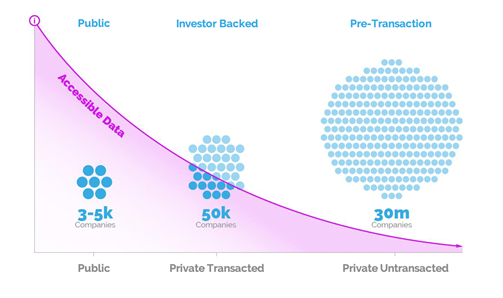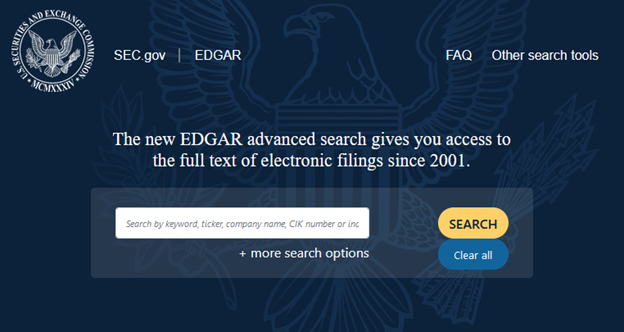Sourcescrub and Grata are joining forces to deliver the market’s most complete market intelligence platform
Learn more

Private equity is one of the most competitive industries, so how can firms get a leg up on their competition and win more often? The answer is simpler than you may think: information.
How you research companies and find information on them is what drives dealmaking. It helps you understand what value a potential investment really has, its history and growth potential, and how good a fit it is for your portfolio. Luckily, there is a huge amount of free company information available, if you know how to find public records on a business.
It’s important to understand the two main types of companies — public vs. private — as they affect what information is available about them. Public companies have much more data regularly available. Not only are they publicly listed and offer shares for the general public to purchase, but they’re also required to publish certain information about themselves.

In contrast, private companies are owned by only a few people or investors — e.g., the company founders or a private equity fund — and shares are not readily available. Although there are many more private than public companies, it’s much more difficult to find public information on these types of businesses, simply because most countries do not require them to publish anything about themselves.
Before we dive in, let’s start by answering this common question: Are business taxes public record? No. Even for public companies, business tax records are confidential information. That is, as long as a business pays them.
In the US, if a company owes taxes, the Internal Revenue Service (IRS) regularly files liens against that business, which are public record. These liens indicate major problems with the business. Much like with business licenses, you can search current tax liens on a state's Department of Revenue website, State Recorder's office, the Secretary of State's office, or even third-party sites.
However, one type of official governmental record that is public for all businesses are the documents necessary for the company to exist and operate in the first place. These records include business licenses, articles of incorporation, government inspection ratings (in the case of a business that requires them, such as a restaurant), and more. Usually, you can find these by searching on the county or state's business licensing website where the company is headquartered.
Public companies are also required to publish information about themselves in both quarterly and annual reports. For instance, in the US, the SEC mandates two forms that must be filed on a regular basis — a 10-K (annually) and a 10-Q (quarterly) — which are then published on the SEC's EDGAR website. They feature data related to the management and direction of the company and more to help current and potential investors make decisions about holding or purchasing shares.

Of course, not all companies have these requirements, and finding private company revenue information is notoriously difficult. That said, all companies like to market themselves, so while it may not be considered an official "public record," there is a wealth of data available through both a company's own and third-party websites.
Press releases, earned and paid media, social media, and much more can be valuable for your search to find public records on a business and compile a robust company profile. To help, we've put together a list of valuable data sources to help you better understand how to research private companies and uncover valuable information on any type of business.
Search engines will often be your first stop when wondering how to find info on a business, and for good reason. The key to making your search effective is to use the features that search engines have provided but you may not know about: filters and operators. These will help you find the data you need in the form you want it.
For example, you may want to find info on a business related to its product offerings. Of course, there's always the company website, but perhaps you want some sales sheets. If you enter the company or product name into Google and add "filetype:pdf" to your search terms, the engine will only give you results that are a PDF. This can be incredibly helpful for digging up little-known info that others may miss.
Looking for industry disruptors? Perhaps limit your search to business review and industry news or list sites. Or maybe you want to know where a company hasn't excelled. The Better Business Bureau (BBB), Yelp, and Google business listings may be a good bet. No matter what information you want to find, search engines are an incredibly powerful tool at your disposal. So, don't be afraid to sharpen up your search skills and put the engines to the test when you want to research private companies.
It's said that the Internet never forgets, and one website helping to ensure its history stays accessible is the Wayback Machine. When you're researching a potential investment opportunity, using sites such as these can help track a company's history: past messaging, product offerings, employees, announcements, and more.
Plus, using it couldn't be simpler. Just enter the domain name of the site, hit "Enter," and you'll be greeted with a calendar of all the historical info the Wayback Machine has. That said, don't expect full site crawls, especially for smaller companies or websites. You'll often find "snapshots" of the homepage and a few subpages over the life of the website, but it’s still extremely helpful when seeking ways to find public records on a business.

While a company's history is important, so is what that company is doing today. Most businesses will have a website that details their products and solutions, and some sites will have pages that cover their management, investors (if any), funding rounds, board members, open positions, press releases, conference attendance announcements, and media coverage.
If the company has invested in content marketing, its website will also offer resources such as whitepapers, eBooks, videos, and blogs — all of which provide key insights into what the company finds valuable, its opinions on pertinent topics, and information that is meaningful to its ideal customer. So, when you're researching a company, pay attention to what it publishes, as it'll give you key insights into the company's values, culture, and direction.
Social media is incredibly important these days, not only as a promotional and lead generation channel, but also to gather customer feedback, provide support, and even recruit new employees. Plus, with the plethora of social media platforms available, each industry has a favorite. For the tech world, it might be LinkedIn. But for creative agencies or restaurants, Instagram is likely more popular.
The key is to understand what resonates with your target investment opportunity, and social media will give you a considerable leg up on what that company considers important, how its customers interact with it, and how it views itself.
The days of going to a physical job site and applying for a position are long gone. Online websites such as LinkedIn, Glassdoor, and Indeed are how companies recruit nowadays, and they're a valuable source of free company information if you know what to look for.
Want to know a company's employee skill gaps? Or even product plans and marketing strategies? What about expansions into new locations? Depending on what a company is recruiting for, job listings are a way to get a clear picture of the growth potential and direction of any company.
Often, these sites will also house company profiles where employees can leave reviews of their employer. While the platforms have become much more of a marketing channel, with internal campaigns to promote companies' ratings becoming increasingly popular, you can still find insights about the culture, management styles, and even product direction.
While you're looking at the open job listings, don't forget to pay attention to the current employees of the company you're researching. Employees and contractors will often have profiles on professional networking sites such as LinkedIn, where they list qualifications and employment timelines, publish professional articles, or like/comment on others' posts.
While employees' posts don't necessarily reflect the opinions of their employers, it can still be incredibly helpful to see their personal beliefs and values, as it can give key insights into the company's culture. On top of that, employee posts can sometimes be the source of company information leaks. Industries with passionate communities, such as those in gaming, often will find unannounced sequels or new intellectual property (IP) mentioned on employees' and contractors' LinkedIn profiles.

Not only do in-person events help you close deals, but they’re also a great way to research private companies and identify new targets. Businesses can sponsor a trade show or put up a booth, but even the attendee list can be a great source of information.
So, when you're trying to understand how to find public records on a business, don't discount the speakers, panelists, and attendees of a conference. These events can be a great networking opportunity, providing you with the chance to meet and strike up a conversation with founders and executives to learn more about them and their companies.
There’s a lot of public information on private companies if you know how and where to look. However, manually gathering and connecting all those scattered tidbits of data into comprehensive company profiles is a major challenge. Fortunately, this is where a deal sourcing platform can help you take your private company research to the next level.
Leading platforms use a combination of AI and human expertise to connect the dots across thousands of the sources listed in this blog post. The resulting web of insight enables dealmakers to quickly get up to speed on millions of private companies, their categories, and even their competitors. Request a demo and see what Sourcescrub can do today.